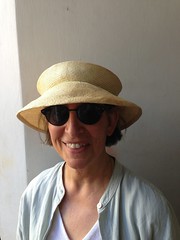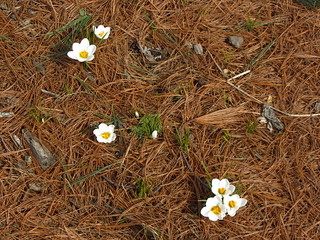
I'm a writer, publishing both as SJ Rozan and, with Carlos Dews, as Sam Cabot. (I'm Sam, he's Cabot.) Here you can find links to my almost-daily blog posts, including the Saturday haiku I've been doing for years. BUT the blog itself has moved to my website. If you go on over there you can subscribe and you'll never miss a post. (Miss a post! A scary thought!) Also, I'll be teaching a writing workshop in Italy this summer -- come join us!
Read/Post Comments (6)

TIN MAN, with spoilers
If you didn't watch this Sci-Fi channel mini-series but you're planning to catch a re-run, you might want to skip this post. Not that anything I'm giving away will wreck it for you, but that's because, if you ask me, there's a lot less there than meets the eye.
First: I like "re-imaginings" of classic works. (Which is NOT the same as plagiarism, and it's not that hard to tell the difference, really. Nor is it the same as "fan fic," something I don't like and an argument we can get into later if anyone wants. Nor is it the same as mere remakes, like the shot-for-shot of PSYCHO that came out a couple of years ago. Bleh.) As a genre writer I'm in the archetype business myself. I think a story that's become as deeply embedded in a culture as the Wizard of Oz has in ours -- and through the second "imagining," by the way, the movie, not the books -- can usefully reflect the culture's changing preoccupations if it's updated, re-thought, re-used. I loved WICKED, the book. Though not the musical, which I thought was fine in all aspects except the music. That was relentlessly mediocre, unmemorable, and stupid, and bad music is sort of a major problem in a musical. The Broadway Oz play I liked was THE WIZ.
I say all this so you'll know that, unlike some of my what-do-we-need-this-for friends, I was intrigued by TIN MAN, and prepared to cut it some slack and enjoy it. And to some extent, I did enjoy it. I mean, I watched the whole thing, over a couple of nights; that's so rare for me that it must mean something. Some of its ideas were interesting and the underlying story was, I thought, pretty good. So what's my problem? Well, I had three.
One was structural: we don't find out until the end that this is not an updated re-telling of the original story, but a new story about Dorothy's great-granddaughter, with echoes of the earlier one. That's fine with me, but I'd like to have known it sooner, so I didn't spend time wondering why some things were so similar and some, like the unaccountably minor role the Wizard plays, so different.
The second was the script itself. Yes, the underlying ideas were good, but both the actual events and the dialogue were bad. Bad bad bad. Case in point: at the end, as the power of the emerald is about to seal the eclipse and darken Oz forever (pretty good), the witch knocks DG (our heroine) over the tower railing. She grabs on! She hangs by her fingernails! Cut to commercial. Viewers chewing on our own fingernails, waiting to see how she gets out of this. After commercial: she climbs back up. What? Did these writers ever hear the word "anti-climax?" Apparently not, because this wasn't the first time this kind of thing had happened. (The Tin Man et al riding like crazy to get DG out of the sarcophagus, and when they arrive -- she's gotten out! Excuse me?) And the dialogue, pee-yoo. Some of the actors, I must say, fought valiantly to create characters worth watching out of the dreck they were given. Zooey Deschanel as DG, Alan Cumming as Glitch (the Scarecrow stand-in), Neal McDonough as the Tin Man (I've always liked him, since MARTIAL LAW), and especially Richard Dreyfuss as the Wizard, did everything they could. I think Raoul Trujillo as Raw (the Lion analog) might have been working as hard, but the material he had was pretty much unconquerable. Most of the other actors seemed to have given up from the beginning and phoned it in.
And my third, and strongest, objection is socio-cultural. If one of the values of this kind of re-imagining is as a cultural pulse-check, then this criticism is as valid as any artistic one. Mine comes in two parts. First, race: in all this vast cast there were only two speaking roles available to black actors? One as the evil witch's evil advisor, and the other as the good queen's magic tutor, a shape-shifter who turns himself into a DOG? (Tutor = Toto, see?) Who, when the others aren't sure whether they can trust him, is ordered to become the dog and then TOLD TO SIT AND STAY? Folks, this kind of thing may not be conscious but it's for sure not meaningless either. Or impact-free.
The same goes for this: Why is it that the only sexuality manifested -- not including the cartoon silliness of the Realm of the Unwanted, which was dry as dust -- erupted when the evil witch, at her most evil, was sucking (!) the life out of failed underlings, or almost-baring her breasts in an orgasmic shudder to release the evil creatures that were part of her? Yes, here she is again, the Woman Who Will Devour You, the woman for whom the lust for power is identical with lust itself. As contrasted with the pure virginal queen, whom she'd locked up, and her innocent, tomboyish sister. Oh, please.
Now, I started out talking about archetypes, and you could say the characters I'm objecting to are archetypes. And I'd agree. But it would be ridiculous to say that makes them okay. Blacks as not quite human and not trustworthy, women's sexuality as lethal -- deeply embedded preoccupations of the worst in American culture, to be sure. And here they are again, presented to us as part of a legend's re-imagining.
Which proves how much remains to be truly re-imagined.
First: I like "re-imaginings" of classic works. (Which is NOT the same as plagiarism, and it's not that hard to tell the difference, really. Nor is it the same as "fan fic," something I don't like and an argument we can get into later if anyone wants. Nor is it the same as mere remakes, like the shot-for-shot of PSYCHO that came out a couple of years ago. Bleh.) As a genre writer I'm in the archetype business myself. I think a story that's become as deeply embedded in a culture as the Wizard of Oz has in ours -- and through the second "imagining," by the way, the movie, not the books -- can usefully reflect the culture's changing preoccupations if it's updated, re-thought, re-used. I loved WICKED, the book. Though not the musical, which I thought was fine in all aspects except the music. That was relentlessly mediocre, unmemorable, and stupid, and bad music is sort of a major problem in a musical. The Broadway Oz play I liked was THE WIZ.
I say all this so you'll know that, unlike some of my what-do-we-need-this-for friends, I was intrigued by TIN MAN, and prepared to cut it some slack and enjoy it. And to some extent, I did enjoy it. I mean, I watched the whole thing, over a couple of nights; that's so rare for me that it must mean something. Some of its ideas were interesting and the underlying story was, I thought, pretty good. So what's my problem? Well, I had three.
One was structural: we don't find out until the end that this is not an updated re-telling of the original story, but a new story about Dorothy's great-granddaughter, with echoes of the earlier one. That's fine with me, but I'd like to have known it sooner, so I didn't spend time wondering why some things were so similar and some, like the unaccountably minor role the Wizard plays, so different.
The second was the script itself. Yes, the underlying ideas were good, but both the actual events and the dialogue were bad. Bad bad bad. Case in point: at the end, as the power of the emerald is about to seal the eclipse and darken Oz forever (pretty good), the witch knocks DG (our heroine) over the tower railing. She grabs on! She hangs by her fingernails! Cut to commercial. Viewers chewing on our own fingernails, waiting to see how she gets out of this. After commercial: she climbs back up. What? Did these writers ever hear the word "anti-climax?" Apparently not, because this wasn't the first time this kind of thing had happened. (The Tin Man et al riding like crazy to get DG out of the sarcophagus, and when they arrive -- she's gotten out! Excuse me?) And the dialogue, pee-yoo. Some of the actors, I must say, fought valiantly to create characters worth watching out of the dreck they were given. Zooey Deschanel as DG, Alan Cumming as Glitch (the Scarecrow stand-in), Neal McDonough as the Tin Man (I've always liked him, since MARTIAL LAW), and especially Richard Dreyfuss as the Wizard, did everything they could. I think Raoul Trujillo as Raw (the Lion analog) might have been working as hard, but the material he had was pretty much unconquerable. Most of the other actors seemed to have given up from the beginning and phoned it in.
And my third, and strongest, objection is socio-cultural. If one of the values of this kind of re-imagining is as a cultural pulse-check, then this criticism is as valid as any artistic one. Mine comes in two parts. First, race: in all this vast cast there were only two speaking roles available to black actors? One as the evil witch's evil advisor, and the other as the good queen's magic tutor, a shape-shifter who turns himself into a DOG? (Tutor = Toto, see?) Who, when the others aren't sure whether they can trust him, is ordered to become the dog and then TOLD TO SIT AND STAY? Folks, this kind of thing may not be conscious but it's for sure not meaningless either. Or impact-free.
The same goes for this: Why is it that the only sexuality manifested -- not including the cartoon silliness of the Realm of the Unwanted, which was dry as dust -- erupted when the evil witch, at her most evil, was sucking (!) the life out of failed underlings, or almost-baring her breasts in an orgasmic shudder to release the evil creatures that were part of her? Yes, here she is again, the Woman Who Will Devour You, the woman for whom the lust for power is identical with lust itself. As contrasted with the pure virginal queen, whom she'd locked up, and her innocent, tomboyish sister. Oh, please.
Now, I started out talking about archetypes, and you could say the characters I'm objecting to are archetypes. And I'd agree. But it would be ridiculous to say that makes them okay. Blacks as not quite human and not trustworthy, women's sexuality as lethal -- deeply embedded preoccupations of the worst in American culture, to be sure. And here they are again, presented to us as part of a legend's re-imagining.
Which proves how much remains to be truly re-imagined.
Read/Post Comments (6)
Previous Entry :: Next Entry
Back to Top